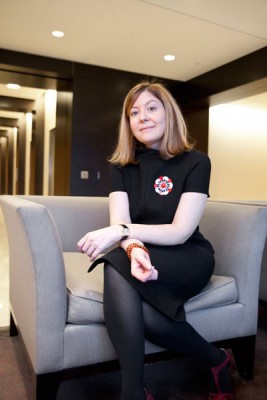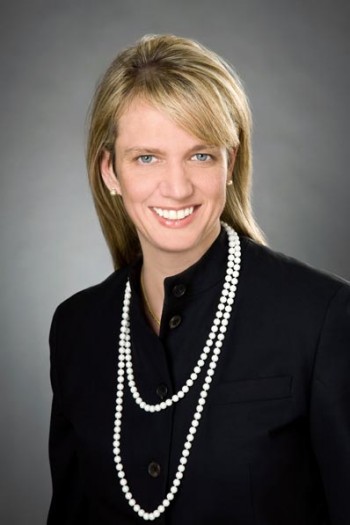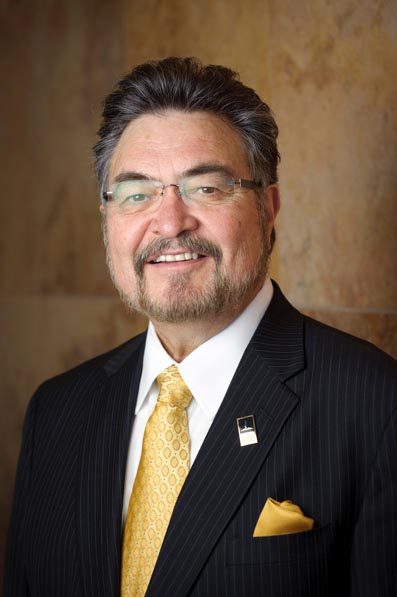Anna T. Pinedo doesn’t much care for waiting around.
In the legal world, she is a star who rose quickly. In only three years, she finished her schooling at Georgetown University’s School of Foreign Service, where she pursued a degree in political science and a minor in Asian Studies. After deciding she was more suited for a career in law, she became the youngest-ever partner at the firm where she was a summer associate during law school. And she did it by the age of 29.
She’s currently a partner in the New York office of Morrison & Foerster, a global law firm known for its imaginative lawyers (and lovingly known as “MoFo”), where her focus is on securities and derivatives.

She’s an accomplished author, with several books to her name. (“They’re things I would have wanted to read when I was a younger associate,” she explains.) She’s often quoted in magazine and newspaper articles that value her expertise in product structuring, securities and derivatives, and regulatory issues. Respected legal rankings IFLR1000, Legal 500, and Chambers (both USA and global) have recognized her skill for several years running, with the latter designating her as a leading lawyer in capital markets-derivatives. She has been recognized as one of the Best Lawyers in America for the past four years. The Burton Awards have lauded her legal writing prowess. The Glass Hammer named her one of the Top Ten Hispanic Women in Business.
But, how did she get here? Rewind.
Pinedo’s life is a string of leaps and bounds. Not only was she a “first” at her firm following law school, she was also the first member of her family to be born in America. Her parents and three siblings moved from Cuba to the United States after her father lost his coffee business during Fidel Castro’s takeover.
Pinedo was off to a rollicking start even by elementary school, where she skipped a grade. If English was the language at school, it was different at home, where her grandmother taught her to read and write in Spanish.
After Georgetown, she earned her Juris Doctor from the University of Chicago Law School and immediately set about her work at Stroock & Stroock & Lavan LLP. “I was lucky to have good mentors and great teachers to learn from,” Pinedo explains. “I’ve always had a sort of impatience and desire to take things on and learn as I go.”
Those mentors have been many. She still keeps in touch with old colleagues, and has coauthored books with MoFo partner Jim Tanenbaum, with whom she has worked her entire career. “Mentorship should be a natural, organic thing,” Pinedo says. “It has always been very spontaneous and genuine. I worked with one or two partners on different projects, got to know them, and they in turn were generous with their time and advice.”
But no influence has been greater than her family’s. “I was raised with a very strong work ethic,” Pinedo remembers. “We were always reminded that we had lots of opportunities in the United States, and that hard work and determination were requirements.”
Cubans may not have a monopoly on work ethic, but there’s something undeniable about the community of hard workers in which Pinedo was raised. Her parents were opinionated and passionate about everything from politics to pop culture, and the dinner table was the scene of vociferous discussion. She recollects that a lively sense of humor, a modest amount of humility, and a very large dose of persistence were the essentials at that table.
Speaking of the dining room, Pinedo is a connoisseur of Cuban cuisine. “A good Cuban sandwich and Cuban coffee are quite restorative,” she notes with a smile. If she’s flying anywhere near Miami, she’ll do her best to stop at Versailles or La Carreta, two of the airport’s cafes, to stock up on sandwiches to bring back to New York.
It’s sustenance that comes in handy, especially considering the demanding nature of her work. Given her expertise, she tackles scores of high-profile projects each year, and she’s one of the go-to names in the address books of some of the biggest financial institutions in the world—places like Bank of America, Barclays, Capital One, Raymond James, Royal Bank of Canada, and UBS.
What fascinates her about securities is the variety: it could be a tech client today, and a financial institution tomorrow. “You get to see all of these industries,” Pinedo says. “There’s a puzzle aspect to figuring out how to structure a securities offering that’s going to work based on the company’s needs and market environment. And it’s tricky: you can have a welcoming market or you can have a period like the financial crisis where it’s choppy and difficult, but you still have to find a path to raising capital.”
On the derivatives side of things, she welcomes the creative process of coming up with new financial instruments that are engineered to solve a particular problem. Having her hands in the finance industry gives her unique insight on the financial crisis. “There have been some very interesting challenges,” she admits. “Having the government be a participant in private enterprise was completely new. And it has been interesting to see the proposed regulations in reaction to the crisis.”
She adds, “It’s a very complex area, and there are still regulations that don’t work particularly well together.” It can be difficult, too, for US regulators to come up with effective approaches for a market that is global.
“Derivative transactions are extremely international,” Pinedo says. “Banks might be booking in a central location, like London, but they may be transacting all over the world with counterparties in different jurisdictions. It becomes difficult for a global market to function under a patchwork quilt of regulation.”
Still, the challenge is part of the allure. Pinedo is fascinated by helping clients understand their business choices, with new options popping up all the time. However, she isn’t anchored to her desk. She rattles off her extracurricular activities: she’s a film buff (anything by Tim Burton, especially his latest film, Frankenweenie); she’s a devotee of photography, art, and anime; she paints and draws in her free time. “I love the creative and marketing side of things,” she says, explaining that she designed the avatar for MoFo’s Twitter capital markets account, @thinkingcapmkts.
But beyond her recreational pursuits, she spends significant time devoting her skill set to philanthropy. She’s on the Service Fund board of directors for the New York chapter of the National Organization of Women, and has used her position there to help fight human trafficking, among other things.
Especially important is her work with Cristo Rey, a Jesuit high school in Spanish Harlem that offers private education for low-income students by running a work-study program to offset the tuition. Every year, five students come to work at Morrison & Foerster’s New York office. “This year, one of our students is a junior who’s thinking about her SATs, and it’s wonderful to be able to show her a range of career options,” Pinedo says. “This is a world students wouldn’t necessarily have access to, and with Cristo Rey they’re able to get a serious shot at college instead of having their education stop at high school.”
For these students her advice is firm, but fair: focus on your studies. Aim high. Trust your instincts and follow your own path. Hear the counsel of others, but don’t be afraid to evaluate it critically. Get off the couch. Cut down on video games and instant messaging. Read more. Above all, work hard.
Given what Pinedo herself has accomplished, they would do well to follow her guidance. A renaissance woman, she has proven herself to be a curious, creative, and industrious legal expert—character qualities that would speak volumes on their own without mentioning her numerous awards and accolades. And beneath it all, there’s a deep respect for her heritage. “There has been no influence on my life and who I am that is greater than my parents’ and my grandmother’s,” she says. “They are responsible for everything that I’ve achieved, and it is their example and their values that continue to guide me.”

